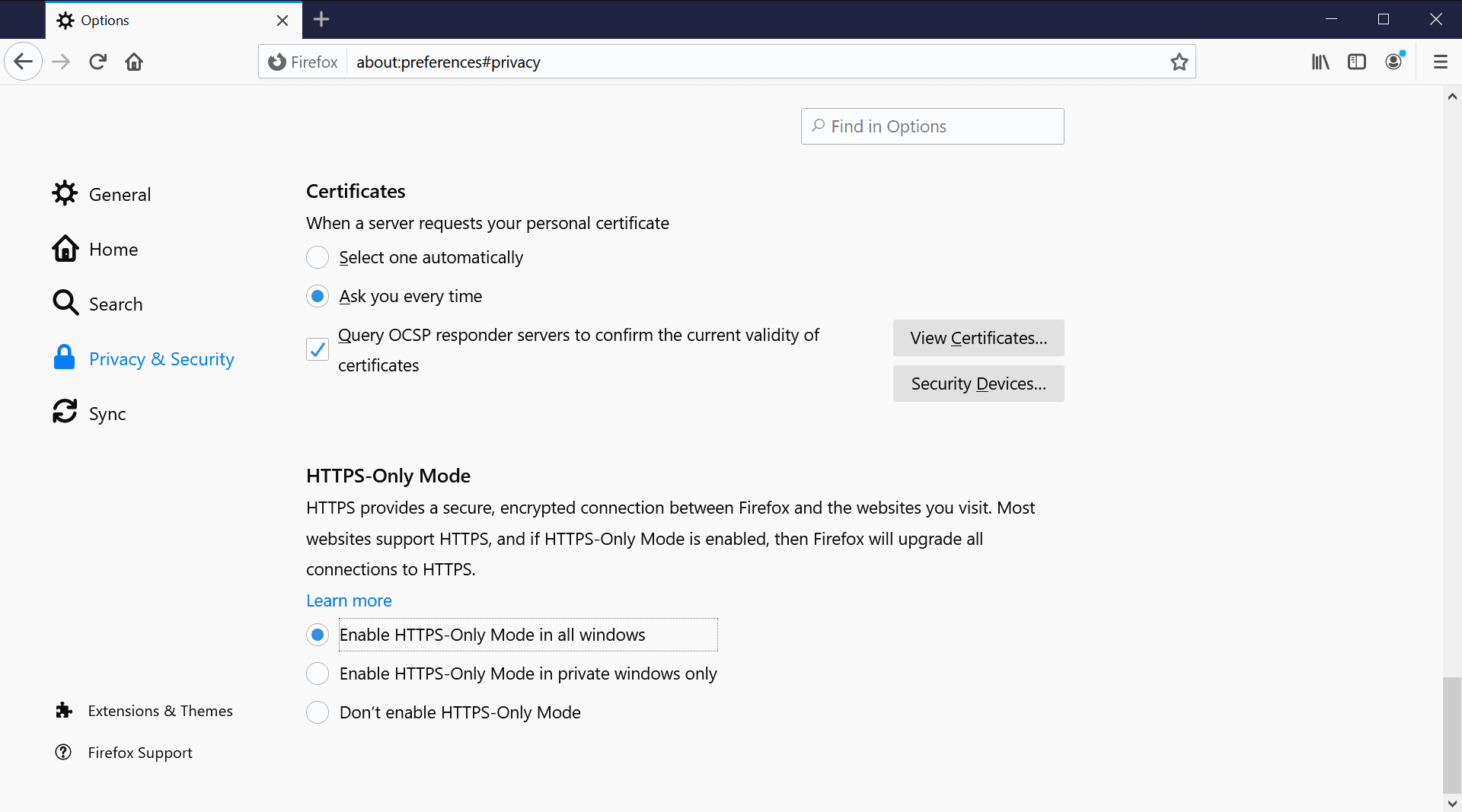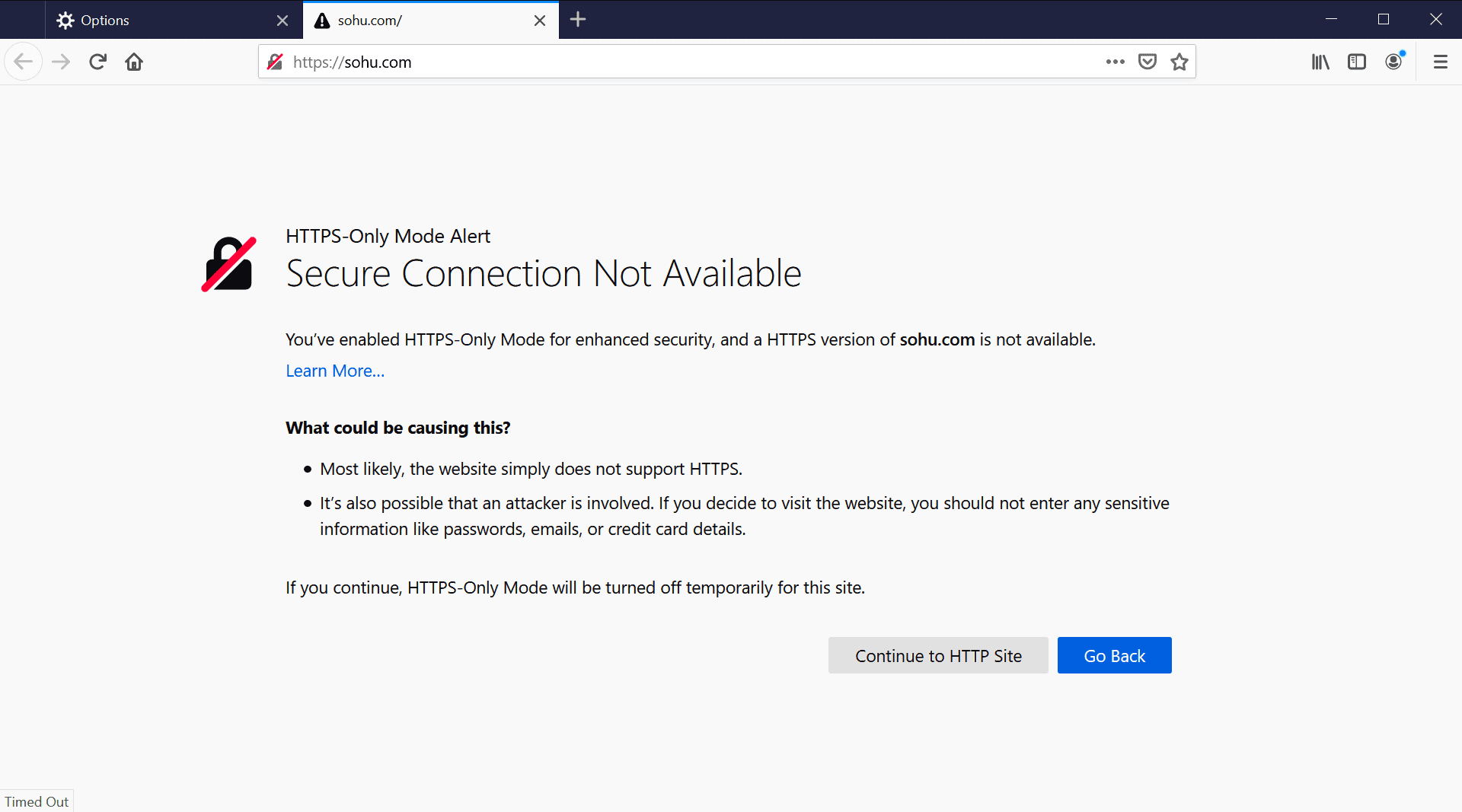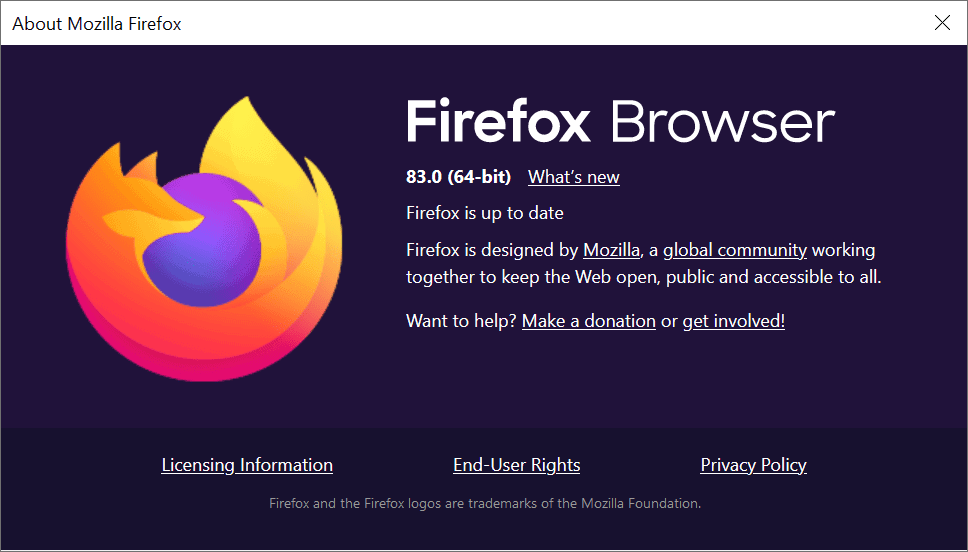Here is what is new and changed in Firefox 83.0

The Firefox 83.0 Stable and Firefox ESR 78.5 release date is November 17, 2020. The new stable version of the Firefox browser and the new Extended Support Release version is provided via in-browser updates and as a standalone download from the official Mozilla website.
Firefox development channels are upgraded to a new version as well; this means that Firefox Beta and Firefox Developer editions are moved to version 84.0 and Firefox Nightly to version 85.0. Firefox for Android will be upgraded to version 83.0.
You can check out the Firefox 82.0 release notes here in case you missed them.
Executive Summary
- Firefox 83.0 includes Security Fixes.
- Firefox 83 supports Mac OS Big Sur. Native-compilation is coming.
- WebRender rollout continues to Windows 7 and 8 devices, and Mac OS 10.12 to 10.15.
- Firefox 85 Nightly is the first version without Adobe Flash / NPAPI support
Firefox 83.0 download and update
Firefox 83.0 Stable and Firefox 78.5 ESR are released on November 17, 2020. The new version is downloaded and installed automatically provided that the automatic updating functionality of the browser has not been disabled.
Please note that we publish the release information prior to the official release. You may see a slight delay before the browser is offered via the browser's in-place upgrade functionality or on Mozilla's website.
You can check the currently installed version by selecting Menu > Help > About Firefox. The very same page runs a check for updates when it is opened to download and install updates if any are available.
Manual downloads are also available. The following pages list direct downloads for supported Firefox channels (will be available later on November 17, 2020)
- Firefox Stable download
- Firefox Beta download
- Nightly download
- Firefox ESR download
- Firefox for Android on Google Play
New features and improvements
Performance Improvements, less memory usage
Work on Firefox's performance and memory usage continued, and as a result, Mozilla notes that Firefox 83.0 page load performance has improved by up to 15%, page responsiveness by up to 12%, and memory usage has been reduced by up to 8%.
New HTTPS-Only Mode
Firefox 83.0 includes an option to accept only HTTPS connections when the new HTTPS-Only Mode is enabled. The browser attempts to upgrade any non-HTTPS connection in the process, and displays a warning screen if the site cannot be loaded at all. Firefox users may then continue to the HTTP site anyway or cancel the operation.
Mozilla added the HTTPS-Only Mode in Firefox 76 and planned to include the setting in Firefox 80 initially, but the rollout has been postponed.

The feature is disabled by default. Firefox users who would like to start using it, can do that in the following way:
- Load about:preferences#privacy in the browser's address bar.
- Scroll down to the new HTTPS-Only Mode section on the page
- Switch from "Don't enable HTTPS Only Mode" to either "Enable HTTPS-Only Mode in all windows" or "Enable HTTPS-Only Mode in private windows only".
The mode offers two advantages: first, that it warns users if a site is still using HTTP, and second, that it attempts to upgrade connections automatically. The latter is helpful if a site supports HTTP and HTTPS connections and does not redirect HTTP to HTTPS automatically.
Search feature changes
Firefox's built-in search functionality has seen a number of changes and improvements in this release:
- When you select a search icon in the address bar displayed at the bottom of the search panel, search mode for that engine is entered to enable the display of suggestions. You get the old behavior by holding down the Shift-key before clicking. The old behavior loaded the search engine's result site right away.
- Firefox displays search shortcuts when it detects that you have entered a supported search URL. It allows users to select the option to run the search directly from Firefox's address bar.
- The bottom bar features buttons to search bookmarks, open tabs, and the browsing history next to using one of the supported search engines.
Other changes
- Firefox makes it clearer which devices or displays are shared when a screen is presented in a video conference in the browser.
- Pinch zooming is supported on Windows devices with touchscreen devices and on touchpads on Mac devices; this can be used to zoom in and out of webpages using pinch-to-zoom, and that makes zooming in and out a lot smoother in Firefox.
- Picture-in-Picture mode supports fast forward and rewind keyboard shortcuts. Just use the left and right arrow keys to go back or forward 15 seconds. All keyboard shortcuts are listed here.
- The new Firefox version supports AcroForm to fill in, print, and saved supported PDF forms.
- The new version comes with a number of screen reader accessibility fixes.
- Firefox users from India will see Pocket recommendations once the browser has been updated.
- Firefox on Mac OS uses less power when restoring sessions with minimized windows.
Firefox for Android
- Firefox 83 for Android includes support for the following additional extensions: FoxyProxy, Bitwarden, AdGuard AdBlocker, Tomato Clock, LeechBlock NG, Web Archives, and Ghostery.
Developer Changes
- Support for CSS Conic Gradients added.
- Scroll badge in Page Inspector can be used to debug scrollable overflow.
- The :screenshot helper command supports the --dpr parameter now when taking fullscreen screenshots.
Known Issues
none listed.
Security updates / fixes
Security updates are revealed after the official release of the web browser. You find the information published here after release.
Outlook
- Firefox 84 includes support for managing optional add-on permissions in the add-ons manager (about:addons).
Additional information / sources
- Firefox 83 release notes
- Add-on compatibility for Firefox 83
- Firefox 83 for Developers
- Firefox for Enterprise 83 - release notes
- Firefox Security Advisories
- Firefox Release Schedule






















To fix the annoying urlbar enlarging create the following about: config setting
ui.prefersReducedMotion = 1
Nope. Doesn’t.
Does not work.
Release Notes::::::::::::::::::::::::::::::::::::::::::::
https://www.mozilla.org/en-US/firefox/notes/
HTTPS-Only Mode break some addons like Forecastfox (fix version)
Is there a way to revert changes in built-in search functionality within about:config?
here..
chrome://global/content/config.xhtml
and bookmark it, then, I open it by typing in “:c”
What exactly am I about to change?
If anyone is looking to revert the change, set “browser.urlbar.update2” to “false” in about:config.
83’s pinch-zoom feature shore is purdy — and quite helpful, actually, on my Surface Go — very smooth!
I note the zoom only goes up from 100% and not below, and this is great for zooming in and then back to the default.
When did they turn webrender back on for displays with refresh rate higher than 60 Hz?
Why are we not talking about the introduction of WARP?
“Https mode only” shoud have at least the option to exclude some sites. :[
There apparently is such an option, but it is not obvious. According to Mozilla:
To “Turn off HTTPS-Only Mode for certain sites
If HTTPS-Only Mode is enabled and you frequently visit a website that does not support HTTPS or does not seem to be rendering certain elements of the page correctly, you can turn off HTTPS-Only Mode for a particular site.
Click on the Lock icon in the address bar.
Use the dropdown under HTTPS-Only Mode and select Off.”
@Herman – Cool, was wondering this myself. Back to using native features instead of extensions!
Thank you @Herman, as you said, it’s not an obvious option. However it seems to work fine. :]
Firefox 83.0, snappier, faster, no doubt; didn’t check the ram.
I abandoned the HTTPS Everywhere not long ago after having read that 95% of the sites are secure, and growing. Firefox’s HTTPS-only mode is not really comparable and should be rather compared to extensions such as ‘HTTPZ’ in that it systematically opens all sites in https and reverts if issue encountered. The point is that such a process, if conducted correctly, means quite a lot of work when considering details, a,d HTTPZ considers them far more and better than Firefox’s HTTPS-only mode. As I understand it the latter logs nothing, which means it’ll always open in https whatever the user’s previous behavior when having faced a non-secured connection. HTTPZ manages that. But more importantly some http sites won’t refuse https (which is what Firefox’s feature waits for) but will open with, i.e. a 520 error : for instance [http://www.les-verbes.com/] which opens but blocks with the 520 error message, and that is not handled by Firefox HTTPS-only mode. In such situations some unaware users may wonder where the heck the problem comes from…
Regardless of users’ experience of this new FF83 HTTPS-only mode no doubt the feature will be an incentive for site admins who hesitate to secure their site, and that may very well be Mozila’s forst aim.
I use HTTPZ and like it. Thanks for the explanation!
@Dennis, I’m bouncing on your comment to provide extra information regarding HTTPZ and the difference with Firefox’s new built-in HTTPS-only mode.
On its AMO page, the HTTPZ extension states :
“Unlike HTTPS Everywhere, this extension does not take care of sub-requests triggered from HTTP-only sites. For now, it outright ignores those requests, because using the same approach with those (retrying on error) is very complicated and has significant drawbacks.”
Unlike ‘HTTPS Everywhere’ and unlike our HTTPS-only mode : when the HTTPS-only mode opens an HTTP url with HTTPS it DOES consider sub-requests. And that is essential, especially for users who don’t manage a site’s connection to 3rd-party sites with a tool such as ‘uBlock Origin’.
This means that if the HTTPS-only mode opens an HTTP sites by switching it to HTTPS… it will carry on with ALL sub-requests, whatever the mixed-content policy :
// pref(“security.mixed_content.block_active_content”, true); // Default=true
// pref(“security.mixed_content.block_display_content”, false); // Default=false
This has its disadvantages. If you address an HPPS-ready site with its HTTP-only url, the HTTPS-only feature will open it with HTTPS and they’re be no problem. But if this site happens to call 3rd-party HTTP sites, the HTTP-only feature (because it handles sub-requests) will address all those 3rd-party connections via HTTPS as well, with possible failues. Without the HPPS-only mode, if the HTTPS-ready site is called by the user via HTTPS, and if the user’s settings for security.mixed_content.block_display_content is ‘false’ (default) then 3rd-part HTTP-only sites will connect.
Example : visit [directory.shoutcast.com] : it’s https, but can be addressed with http only.
– If you call it with HTTPS and FF’s HTTPS-only mode is ‘false’ : shoutcast will call 3rd-party unsecured sites (radio stations, most of which are still unsecured) with no issue (given security.mixed_content.block_display_content = true).
– if you call it with HTTP and FF’s HTTPS-only mode is ‘true’ : shoutcast will open via HTTPS (fine!) but will block on retrieving 3rd-party non-secured urls… because it handles sub-requests and forces them to HTTPS leading to possible issues.
The idea is that handling a site’s sub-requests has its advantages and disadvantages.
Who cares about HTTPS? Why it is such a big deal?
Folks that know it, they know… But there are 90-or-something-% that haven’t even heard of it.
@Tom:
Have you tried it yet? When FF initially arrives at a non-https site it gives you an error page with the option to proceed to the HTTP site. It then remembers your choice next time you visit (the page properties under lock icon show ‘Off temporarily’). You can also select ‘Off’ to make it permanent, I suppose?
@ShintoPlasm, yes, I’ve tried it. I’ve even made a userChromeJS script which displays a toolbar toggle button for the ‘dom.security.https_only_mode’ boolean true/false.
But all sites don’t refuse an HTTPS connection in a way that allows Firefox to display its error page and ask the user’s decision accordingly. I’ve given above the example of les-verbes.com, but there are other similar sites, and that’s bothering.
For HTTP only sites which trigger Firefox’s error page and notification to the user about continuing or not (and that’s the wide majority of HTTP-only sites, I presume) … I did notice that my choice (at least when I chose to carry on to HTTP) was remembered for the session, but not after restarting Firefox.
You mention Firefox’s page properties under lock icon ‘Off temporarily’ : because i’ve deeply tweaked Firefox (settings and GUI) this lock icon is part of the lot of items I’ve hidden, and I’d have to reconsider my FF GUI layout to get it back. May seem a nonsense to modify built-in features but my approach to a browser’s usability, subjective as always, is such that I happen to modify features and related GUI components in such a way that it may have consequences… as with this example.
I’ll think about it. Thanks for your information, mainly this lock icon’s connection to the HTTPS-only feature.
I just updated and font rendering seems worse than 82, I’m using Windows and a gerforce gpu.
Any ideas?
I see it also. I think starting with 80, it started going downhill. Firefox used to have bold/dark fonts especially compared to Chrome, but now, more so with 83, the fonts are thin/light/washed out.
Font rendering was very good in Firefox 82 and previous Firefox versions, but fonts became very “washed out” after update to Firefox 83. Darker fonts were a significant advantage over Chrome, but now it’s gone??
[I am using Windows and Intel Integrated Graphics]
Turn off hardware accelaration?
Sure, but that’s definitely not a long-term solution. I might try creating a new profile and see if that fixes it.
So, what’s all the fuss about Firefox? I’m sorry, everything it all has to do disappoints me–turns me off–such that I have, for a while been pressed to (sometimes assailed) not that I like it, but more steady Palemoon.
Personally, I love Firefox because of the Sidebery addon. It has completely changed how I manage having heaps of tabs open. I have tried dozens of other tab managers in all the major web browsers and have found them all clunky to use compared to Sidebery
Totally agree ! Sidebery is a must have ! Really faster than other vertical tabs managers !
I just miss the coloration of tabs by tree (like on the old tabkit) : very handful to find your researches quickly.
I just hope that the author will continue to develop it because there not evolution since few months on github…
how is it, compared to https everywhere?
Did we still need HTTPSeverywhere?
Good release, I love HTTPS only mode. That means I can pretty not use HTTPSeverywhere.
I suppose claustromaniac’s HTTPZ is no longer useful, either – ??
Yup, less one extension needed. :)
They no longer maintain the wiki page – https://wiki.mozilla.org/Firefox/Roadmap/Updates
Does anyone know where to look for changelog except ghacks?
See https://www.mozilla.org/en-US/firefox/releases/
Thank you!
Seems like Firefox team lost the interest to write weekly for updates.
if you are looking for it too, this is helpful = https://blog.nightly.mozilla.org/
clicking on what’s new in firefox brings you yo https://www.mozilla.org/en-US/firefox/83.0/releasenotes/?utm_source=firefox-browser&utm_medium=firefox-browser&utm_campaign=whatsnew
https://www.mozilla.org/en-US/firefox/notes/
Here calendar for new releases version firefox
https://wiki.mozilla.org/Release_Management/Calendar